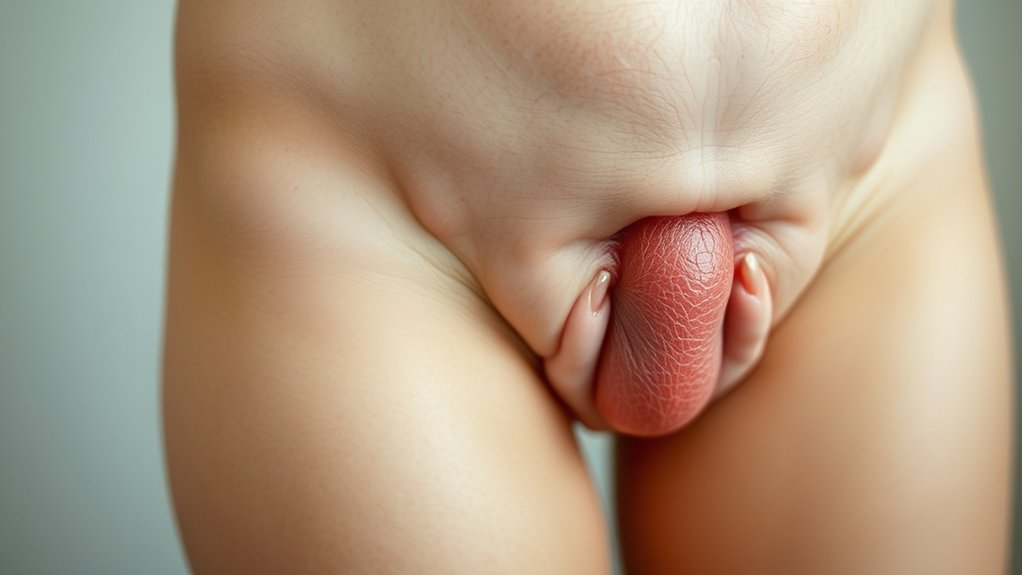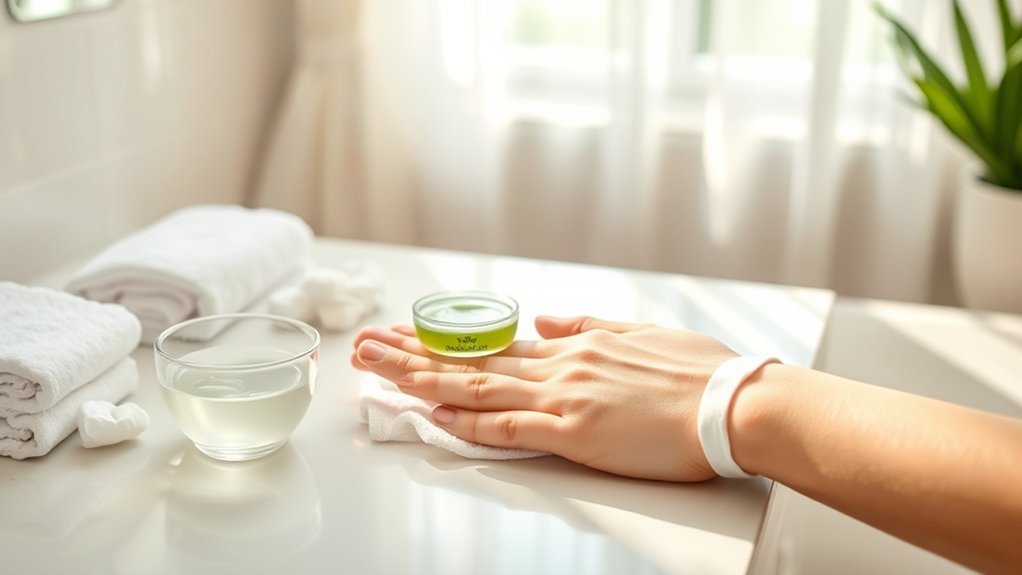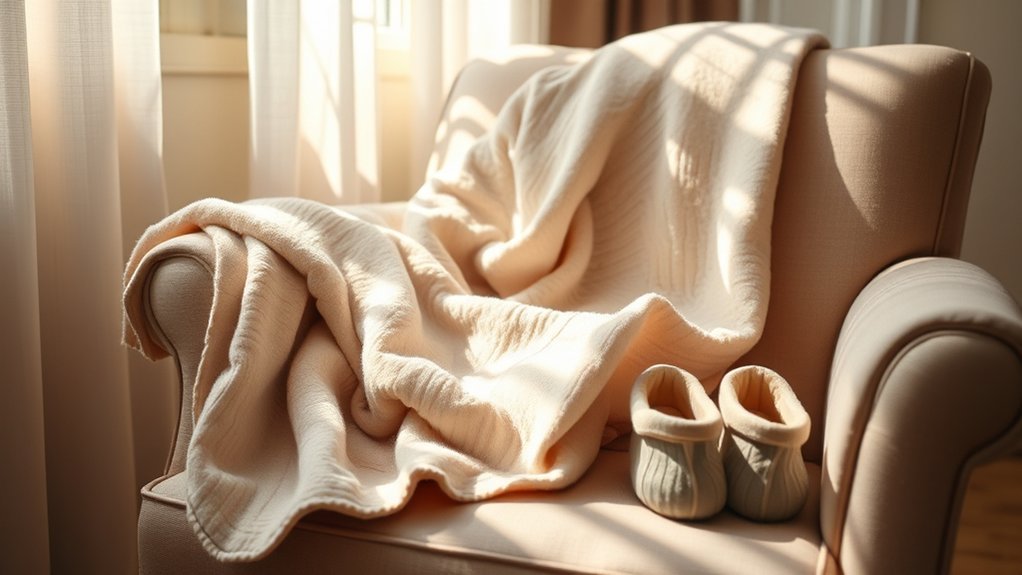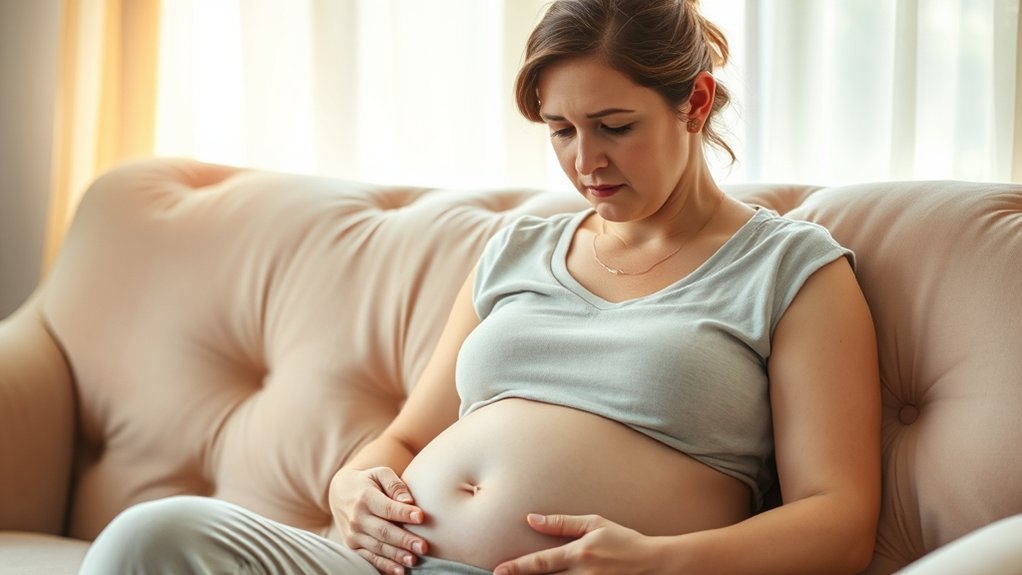If you’ve recently given birth, you might be among the 40% of new mothers experiencing postpartum hemorrhoids. These can cause discomfort, pain, or even bleeding in the anal area. Understanding the causes, symptoms, and treatments can help you manage this common issue effectively. As you navigate your recovery, it’s vital to know what to expect and when to seek help. Let’s explore the essentials of postpartum hemorrhoids together.
What Are Postpartum Hemorrhoids?

Postpartum hemorrhoids are a common issue many women face after childbirth, affecting around 40% during the postpartum period.
These hemorrhoids are swollen veins in the rectum or anus, which can lead to discomfort, pain, itching, and even bleeding during bowel movements. They can be classified as internal, located inside the rectum, or external, found around the anal opening.
Swollen veins in the rectum or anus can cause discomfort, pain, itching, and bleeding during bowel movements.
The increased pressure from the growing uterus during pregnancy, combined with hormonal changes and straining during labor, greatly contributes to their development.
Most postpartum hemorrhoids typically resolve on their own within a few weeks, although symptoms can persist for up to 12 weeks.
Various treatment options, including dietary changes and warm sitz baths, can help alleviate discomfort and prevent constipation.
What Causes Postpartum Hemorrhoids?
Postpartum hemorrhoids often stem from increased pelvic pressure during pregnancy and the straining that can occur during labor.
As your body adapts to the physical demands of childbirth, the veins in your pelvic area may become swollen and inflamed.
Understanding these causes can help you manage and alleviate discomfort during your recovery.
Increased Pelvic Pressure
As your body adjusts after childbirth, increased pelvic pressure can lead to a number of discomforts, including hemorrhoids.
During the postpartum period, the growing uterus exerts downward force on pelvic veins, hindering blood flow and causing swelling in the rectal area. Elevated progesterone levels relax blood vessel walls, making them more prone to swelling, which can contribute to hemorrhoid symptoms.
Additionally, constipation, often due to dietary changes and reduced activity, creates further pressure during bowel movements, increasing your risk of developing hemorrhoids.
Approximately 25 to 35 percent of women experience postpartum hemorrhoids, with risk factors including the size of your baby and the use of instrumental delivery methods.
Understanding these factors can help you manage your discomfort effectively.
Straining During Labor
The physical demands of labor can greatly impact your body, especially concerning the development of hemorrhoids. Straining during labor increases intra-abdominal pressure, leading to postpartum hemorrhoids. Here’s how it happens:
- Pushing during childbirth causes rectal veins to enlarge.
- Increased pressure from larger babies or instrumental deliveries heightens the risk of swelling.
- Constipation during pregnancy can compound straining, worsening hemorrhoid formation.
- Inflammation of the rectal veins results from the extreme physical stress of labor.
Approximately 40% of women experience these symptoms after delivery. Understanding these factors can help you manage your recovery and seek appropriate care for any discomfort you encounter postpartum.
Symptoms of Postpartum Hemorrhoids
Experiencing discomfort in the anal area after childbirth isn’t uncommon, as symptoms of postpartum hemorrhoids affect nearly 40% of women.
Discomfort in the anal area post-childbirth is common, with nearly 40% of women experiencing postpartum hemorrhoids.
You might notice bright red bleeding during bowel movements, which can be alarming but is often manageable. Additionally, sensitive lumps around the anus may develop, causing pain and itching.
These hemorrhoids can be classified as internal or external, with external hemorrhoids typically being more painful and uncomfortable. Mucus discharge on toilet paper can also occur.
While many women find that symptoms improve within a few weeks, it’s essential to consult a healthcare provider if your discomfort persists beyond a week or if you experience heavy bleeding or other severe complications. Community involvement in maternal health is crucial for ensuring that women receive the care they need during this time.
Your health is important, so don’t hesitate to seek help.
How Long Do Postpartum Hemorrhoids Last?
Postpartum hemorrhoids commonly last anywhere from a few days to six weeks after childbirth. About 40% of women experience these due to increased pressure during delivery.
You’ll likely notice significant improvement within two weeks postpartum, but some symptoms may persist. Here’s what to keep in mind:
- Most postpartum hemorrhoids go away on their own.
- They often resolve within a few days with home treatment.
- If symptoms last longer than seven days, it’s wise to consult a healthcare provider.
- Watch for severe symptoms like heavy bleeding or pain that disrupts daily activities, which require immediate medical attention.
Being aware of these timelines can help you manage your recovery effectively.
Postpartum Hemorrhoids Treatment

When dealing with postpartum hemorrhoids, you can start with home remedies like dietary changes and topical treatments for relief. Increasing your fiber intake and staying hydrated can ease symptoms, while warm sitz baths provide soothing comfort. If your discomfort persists or worsens, it’s important to consult a healthcare provider for further evaluation and treatment options. Additionally, maintaining clean drinking water is vital for overall health, which can also influence recovery.
Home Remedies for Relief
Finding relief from postpartum hemorrhoids is vital for your comfort and recovery. You can try several effective home remedies:
- Sitz Bath: Soak in warm water for 15 minutes several times daily to soothe discomfort and reduce swelling.
- Ice Pack: Apply an ice pack wrapped in cloth to the affected area for 20-30 minutes to alleviate pain.
- Witch Hazel: Use cotton balls or pads soaked in witch hazel to reduce inflammation and irritation around the anus.
- High-Fiber Diet: Incorporate fruits, vegetables, and whole grains to soften stools and prevent constipation, which is important for postpartum women.
Remember to stay hydrated by drinking at least eight cups of water daily to maintain regular bowel movements.
Medical Treatment Options
While dealing with postpartum hemorrhoids can be uncomfortable and distressing, various medical treatment options are available to help alleviate your symptoms effectively.
Over-the-counter topical creams containing hydrocortisone or witch hazel can reduce inflammation and itching. If these conservative measures don’t provide relief, consult your healthcare provider. They may recommend procedures like rubber band ligation or sclerotherapy for persistent hemorrhoids.
For severe pain, prescription medications might be necessary if over-the-counter options fall short. If your hemorrhoids become thrombosed, causing extreme discomfort, surgical intervention may be required for removal.
Regular follow-ups with your healthcare provider are essential to monitor your condition and adjust treatment plans, especially if symptoms persist beyond a few weeks.
How to Prevent Postpartum Hemorrhoids

Preventing postpartum hemorrhoids is essential for your comfort and recovery after childbirth. Here are some effective strategies to help you:
Preventing postpartum hemorrhoids is crucial for a smoother recovery and enhanced comfort after childbirth.
- Maintain a high-fiber diet: Focus on fruits, vegetables, and whole grains to prevent constipation.
- Stay hydrated: Drink at least six to eight glasses of water daily to keep stools soft and reduce strain during bowel movements.
- Engage in regular light exercise: Short walks can promote healthy bowel function, helping to prevent constipation.
- Respond to bathroom urges promptly: This helps avoid drier, harder stools that lead to straining.
Additionally, consider performing daily Kegel exercises to strengthen pelvic and rectal muscles, which may further reduce the risk of developing hemorrhoids during and after pregnancy.
When to Call the Doctor About Postpartum Hemorrhoids
Even with preventive measures in place, some women may still experience postpartum hemorrhoids that require medical attention.
If you notice persistent discomfort or your symptoms don’t improve after seven days of at-home treatment, consult a doctor. It’s essential to seek immediate help if you experience severe pain or heavy bleeding, as this could indicate serious complications.
Additionally, if you see signs of infection, like fever, chills, or pus, don’t hesitate to contact a healthcare provider. Recurring hemorrhoids after your initial postpartum period should also prompt a discussion with your doctor to guarantee your health is managed effectively.
Effective Home Remedies for Postpartum Hemorrhoids
Postpartum hemorrhoids can be a painful and uncomfortable experience, but there are effective home remedies that can help alleviate your symptoms.
Postpartum hemorrhoids can be distressing, but effective home remedies can help ease your discomfort.
Here are some strategies to contemplate:
- High-fiber diet: Incorporate fruits, vegetables, and whole grains to soften stools and prevent constipation.
- Plenty of water: Drink at least eight cups daily to keep hydrated and maintain stool softness, especially while breastfeeding.
- Warm sitz baths: Soak for about 15 minutes several times a day to soothe pain and reduce swelling of blood vessels.
- Witch hazel: Apply on cotton balls or pads to relieve itching and inflammation.
These remedies can provide significant pain relief and help you manage postpartum hemorrhoids more effectively.
The Importance of Seeking Professional Help

While many new mothers experience discomfort from hemorrhoids after childbirth, it’s important to recognize when professional help is necessary.
If you notice persistent symptoms, such as rectal bleeding or severe pain, consulting a healthcare provider is essential. Hemorrhoids affect about 40% of postpartum women, and ignoring them can lead to complications, including anal fissures or other colorectal issues.
A healthcare provider can offer tailored treatment options, including lifestyle adjustments, dietary changes, or medications, facilitating your recovery. Addressing any fears or embarrassment you might feel is significant, as open communication can guarantee you receive the care you need. Additionally, discussing maternal health conditions with your provider can ensure a comprehensive approach to your recovery.
Regular postpartum check-ups also help monitor your health and address lingering discomfort, making professional guidance invaluable during this recovery phase.
Frequently Asked Questions
When to Worry About Hemorrhoids Postpartum?
You should worry about hemorrhoids postpartum if you experience severe pain, heavy rectal bleeding, persistent symptoms beyond a week, or if you notice signs of infection like fever. Seek medical help for proper evaluation and treatment.
How to Sit With Hemorrhoids Postpartum?
To sit comfortably with postpartum hemorrhoids, use a padded seat, elevate your knees slightly, and take breaks to stand or lie down. Gentle movements can help ease discomfort and improve blood circulation.
How Long Do Haemorrhoids Take to Heal After Birth?
Hemorrhoids can feel like an eternity, but most heal within a few weeks after birth. By two weeks, you’ll likely see significant improvement, with many fully recovering in six to twelve weeks with proper care.
How Do You Treat Hemorrhoids After Giving Birth?
To treat hemorrhoids after giving birth, increase your fiber intake, stay hydrated, and consider over-the-counter creams. Warm sitz baths can also provide relief. If symptoms persist, consult your healthcare provider for further evaluation.
Conclusion
In conclusion, postpartum hemorrhoids can be a painful and frustrating experience for new mothers, but relief is within reach. By implementing effective home remedies and preventive measures, you can tackle these issues head-on. Remember, if symptoms linger or worsen, don’t hesitate to consult a healthcare provider—your well-being is paramount. After all, no one should have to suffer in silence when solutions are just a conversation away. Your journey to comfort is just as important as your journey into motherhood.
